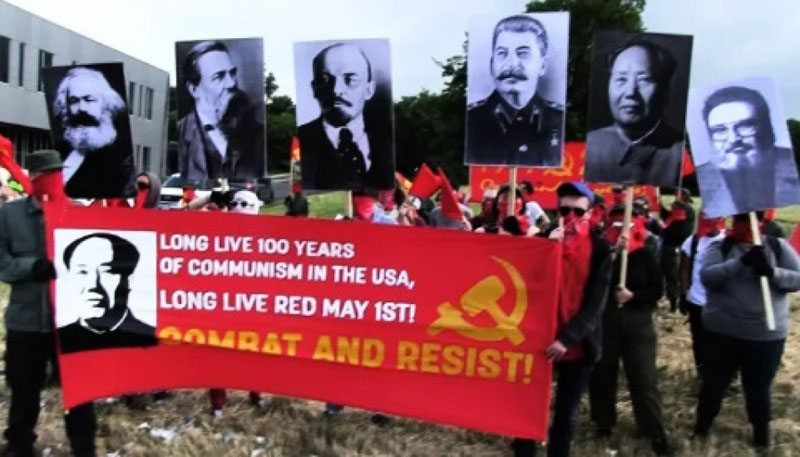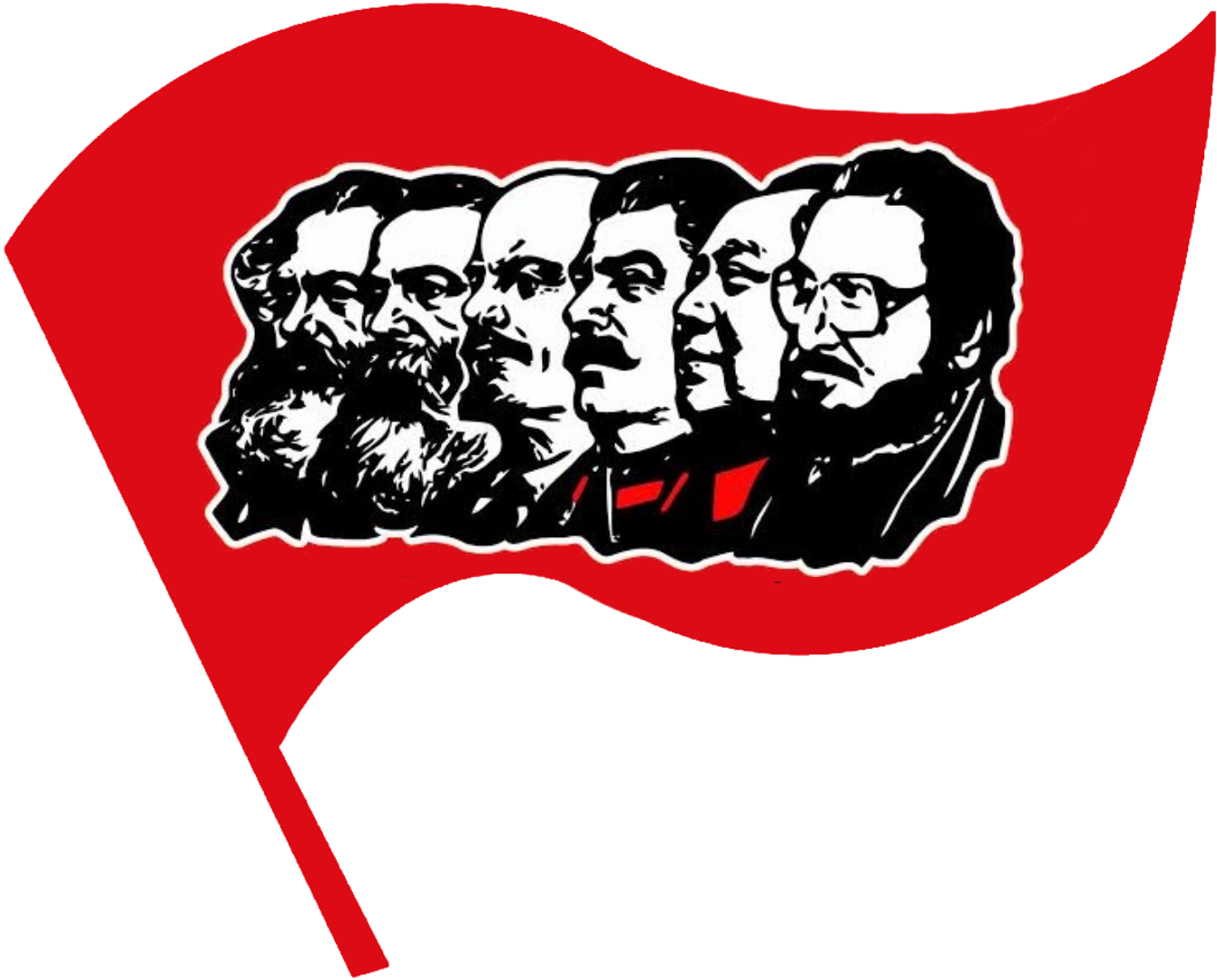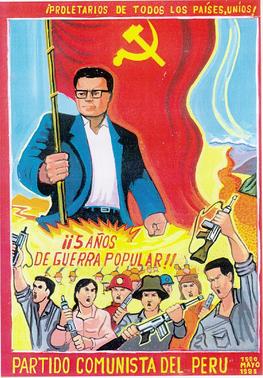More languages
More actions
- Not to be confused with Mao Zedong Thought

Maoism, also known as Marxism–Leninism–Maoism (MLM), is a dogmatic current of communist thought. Being first synthesized as separate from Mao Zedong Thought (MZT) by Abimael Guzmán of the Shining Path party, the ideology has also been adopted by other groups such as the New People's Army (NPA) of the Philippines and the Communist Party of India (Maoist). Maoism considers itself to be a step forward from Marxism–Leninism, differing from MZT.[1][2][3] Maoism believes in the ideas of the Cultural Revolution, Protracted People's War (PPW), New Democracy, and Mass Line, all of which take inspiration from MZT. People's War is a the form of guerrilla warfare which was developed specifically for the material conditions of China in the previous century, although it is usually adopted as a universal dogma by Maoists, even in developed countries.
| Part of a series on |
| Maoism |
|---|
 |
Development
Origin of the term
Maoism was first coined by bourgeois historians and politicians to describe the conditions of China under Mao Zedong.
Mao never preferred the term, not allowing his name along with Marx, Lenin or Stalin and even stated that "there is no Maoism",[4] which is true, as the specific set of policies taken by Mao were merely Sinicized Marxism–Leninism.
The term Marxism–Leninism–Maoism represents the Maoist view of their ideology being a development and "higher stage" of Marxism–Leninism.
Synthesis of Maoism
Chairman Gonzalo is the first person to synthesise the term "Maoism" although the application of Maoism appears significantly earlier starting with the Communist Party of the Philippines in 1968.[5]
Gonzalo states that Maoism is the third stage of Marxism, and that it had to be synthesised due to the following three reasons: Mao's contribution to the idea of "Bureaucrat Capitalism", Mao's establishment of the "Socialist Political Economy", and Mao's military theory.[6]
Using the ideology "Maoism"
The Communist Party of the Philippines has adopted the term after the foundation of Gonzalo Thought, along with the Communist Party of India (Maoist) once it was formed. Other notable Marxist–Leninist–Maoist movements can be seen in Russia and China.
Characteristics
Mao Zedong Thought
See main article: Mao Zedong Thought
Maoism follows the aspects of Mao Zedong Thought, which include the few new developments made by Mao such as New Democracy, the Mass Line, and Mao's Three Worlds Theory.
Anti-revisionism
See main article: Anti-revisionism
Gonzalo emphasises the strength to be against revisionism, stating that
"Revisionism obviously is a cancer, a cancer that has to be ruthlessly eliminated."[6]
Thus Maoism, like Hoxhaism, puts a further emphasis on anti-revisionism, stating it to be "substituting bourgeois philosophy into Marxism,"[6] but in practice, as with Hoxhaism, it only ends being a dogmatic and revisionist position which doesn't let one surpass the infantilism that this generates and provokes division in the communist movement.
Universality of Protracted People's War
See main article: Protracted people's war
Gonzalo puts an emphasis that a Protracted People's War is universal, stating that it is adaptable to the countryside and the city,
People's war is universally applicable, in accordance with the character of the revolution and adapted to the specific conditions of each country.[6]
Emphasis of a joint dictatorship
Gonzalo stated, due to the material conditions of Peru, that a joint dictatorship had to form between the proletariat, peasantry and the progressives (petit bourgeoisie)[6].
Emphasis on revolutionary violence
Gonzalo also stated that violence must be done, that reform is impossible to achieve.
With regard to violence we start from the principle established by Chairman Mao Tsetung: violence, that is the need for revolutionary violence, is a universal law with no exception. Revolutionary violence is what allows us to resolve fundamental contradictions by means of an army, through people's war.[6]
Criticism
Universality of PPW
A lot of Marxist–Leninists do not think that a protracted people's war is universal, that it is only adaptable to the material conditions presented in particular Third World Nations, and it couldn't be accomplished in the First World particularly due to a lack of peasantry and the logistics that the bourgeois state holds that are able to destroy the PPW in developed countries.
Anti-AES
Maoists often view present or past socialist states especially the post-Stalin Union of Soviet Socialist Republics and Warsaw Pact as losing their socialist aspects and instead, according to Maoists, becoming revisionist or social-imperialist.
Soviet Union
Gonzalo views Stalin as a great person, and not revisionist.[citation needed] When Khrushchev and Gorbachev were the leaders of the Soviet Union, Gonzalo denounces them as "revisionist", as Gonzalo stated Khrushchev's utopian ideas such as "Communism could be reached by 1980."[6]
China

Gonzalo views Mao as a great person, and the person that he believes to have created a new stage for Marxism. During the Deng Xiaoping era of reforms, Gonzalo called him a revisionist and stated that he "restored capitalism".[6] Most Maoists think that the modern People's Republic of China is social imperialist, and a dictatorship of the bourgeoisie.
Vietnam
Gonzalo views Ho Chi Minh as a "centrist", that aligns with the Marxists and Revisionists.[6] He claims that he was a revisionist, because he didn't tackle revisionism, and after his death, the Doi Moi reforms occurred.
DPRK
Gonzalo never specifically states that the DPRK is a revisionist nation,[6] however, most Maoists despise the DPRK and its Eternal Leader Kim Il-Sung. They regard Juche as an ultranationalist deviation from Marxism and argue that the planned economy of the DPRK is operated by a hidden class of bourgeoisie.[7]
Cuba
Gonzalo never specifically states that Cuba is a revisionist nation, however, he claims that Castro let the Soviet Union commit "social-imperialism" onto the nation.[6] Most Maoists also despise Cuba, especially during the private reforms that have taken place.
Fetishisation of revolutionary violence
Marxist-Leninists typically use revolutionary violence as an alternate means of establishing socialism in contrast to reformism, as evidence exists that reformism typically cannot work. However most Marxist–Leninists despise the revolutionary aims that Maoism attempts to achieve, particularly because it is acting in a similar way that Vladimir Lenin described as "Revolutionary Adventurism".[8] A specific case of Maoist revolutionary violence would be the Communist Party of Peru – Shining Path, which the party itself uses methods such as assassinations, bombings, and cult-like behaviour.[9]
Use of the peasantry
Gonzalo stated that the number of the proletariat is insufficient,
The peasantry, especially the poor peasants, are the main participants, as fighters and commanders at different levels in the People's Guerrilla Army. The workers participate in the same ways, although the percentage of workers at this time is insufficient.[6]
This could mean that this is a peasant-led revolution and not a proletarian-led one.
See also
References
- ↑ Marxism-Leninism-Maoism Basic Course by Foreign Languages Press Chapters 1-8 (Audiobook)
- ↑ Marxism-Leninism-Maoism Basic Course by Foreign Languages Press Chapters 9-16 (Audiobook)
- ↑ Marxism–Leninism–Maoism basic course (PDF) (5th ed.).
- ↑ Mao on Maoism: The Dialectical Case for Mao Zedong Thought
- ↑ Stanford CISAC - Communist Party of the Philippines
- ↑ 6.00 6.01 6.02 6.03 6.04 6.05 6.06 6.07 6.08 6.09 6.10 6.11 Interview with Chairman Gonzalo
- ↑ “The country which in the West is usually called “North Korea”. The DPRK was established in the northern part of Korea by Communist anti-Japanese guerrilla forces at the end of World War II, and with the substantial support of the Soviet Union. At the same time U.S. imperialism—with the help of the defeated Japanese military forces—quickly established its control over the southern part of Korea, which set the stage for its horrendous imperialist Korean War (1950-1953) and the continued division of the Korean nation since that time.
The highly deficient sort of top-down socialism which was originally established in the DPRK was—if anything—a more extreme form of the bureaucratic type of socialism which existed in the Soviet Union in the Stalin era. Since—as in the USSR—the DPRK regime did not know or use the mass line in politics, industry or agriculture, this type of society tended to soon become more and more undemocratic and authoritarian. Over the years it has degenerated totally away from anything which can be remotely considered as genuine “socialism” (which, after all, must most essentially be based on the rule of the people themselves). The DPRK is now best characterized as an ultra-nationalistic form of state capitalism, directed by a tiny militarily-obsessed elite social class, and for the primary benefit of that very privileged governing class. Even more absurdly, this DPRK ruling class has turned its regime into one which is very close to a hereditary absolute monarchy, which was ruled first by Kim Il Sung, then by his son Kim Jong Il, and now by his son, Kim Jong Un.”
"Democratic People's Republic of Korea (DPRK)". massline.org. Retrieved 2023-12-4. - ↑ “In their defence of terrorism, which the experience of the Russian revolutionary movement has so clearly proved to be ineffective, the Socialist-Revolutionaries are talking themselves blue in the face in asseverating that they recognise terrorism only in conjunction with work among the masses, and that therefore the arguments used by the Russian Social-Democrats to refute the efficacy of this method of struggle (and which have indeed been refuted for a long time to come) do not apply to them. Here something very similar to their attitude towards “criticism” is repeating itself. We are not opportunists, cry the Socialist-Revolutionaries, and at the same time they are shelving the dogma of proletarian socialism, for reason of sheer opportunist criticism and no other. We are not repeating the terrorists’ mistakes and are not diverting attention from work among the masses, the Socialist-Revolutionaries assure us, and at the same time enthusiastically recommend to the Party acts such as Balmashov’s assassination of Sipyagin, although everyone knows and sees perfectly well that this act was in no way connected with the masses and, moreover, could not have been by reason of the very way in which it was carried out—that the persons who committed this terrorist act neither counted on nor hoped for any definite action or support on the part of the masses.”
V.I. Lenin (1902). Revolutionary Adventurism. - ↑ “[T]errorism and sabotage are not part of this class violence in Marxism-Leninism. If they have occurred in the history of revolutionary movements, they have been secondary and usually aimed against foreign invaders. Systematic destruction of means of production is also not conceivable within Marxist thought.
The violence that the Shining Path claims to derive from Marxism-Leninism is primarily directed towards the Peruvian peasantry, a historically subjugated class. This class is experiencing rapid changes and is rich in new social contradictions. According to classifications by sociologists and anthropologists from the CIA and other foreign intelligence services, the peasantry is a social base that the Shining Path considers useful for their so-called revolutionary violence. They aim to destroy the social and economic relations of the peasant class, applying selective terrorism and assassinating local leaders and authorities.”
Andreo Matías (1988). The CIA's Shining Path: Political Warfare: 'The inconsistency of Shining Path Thought'.
